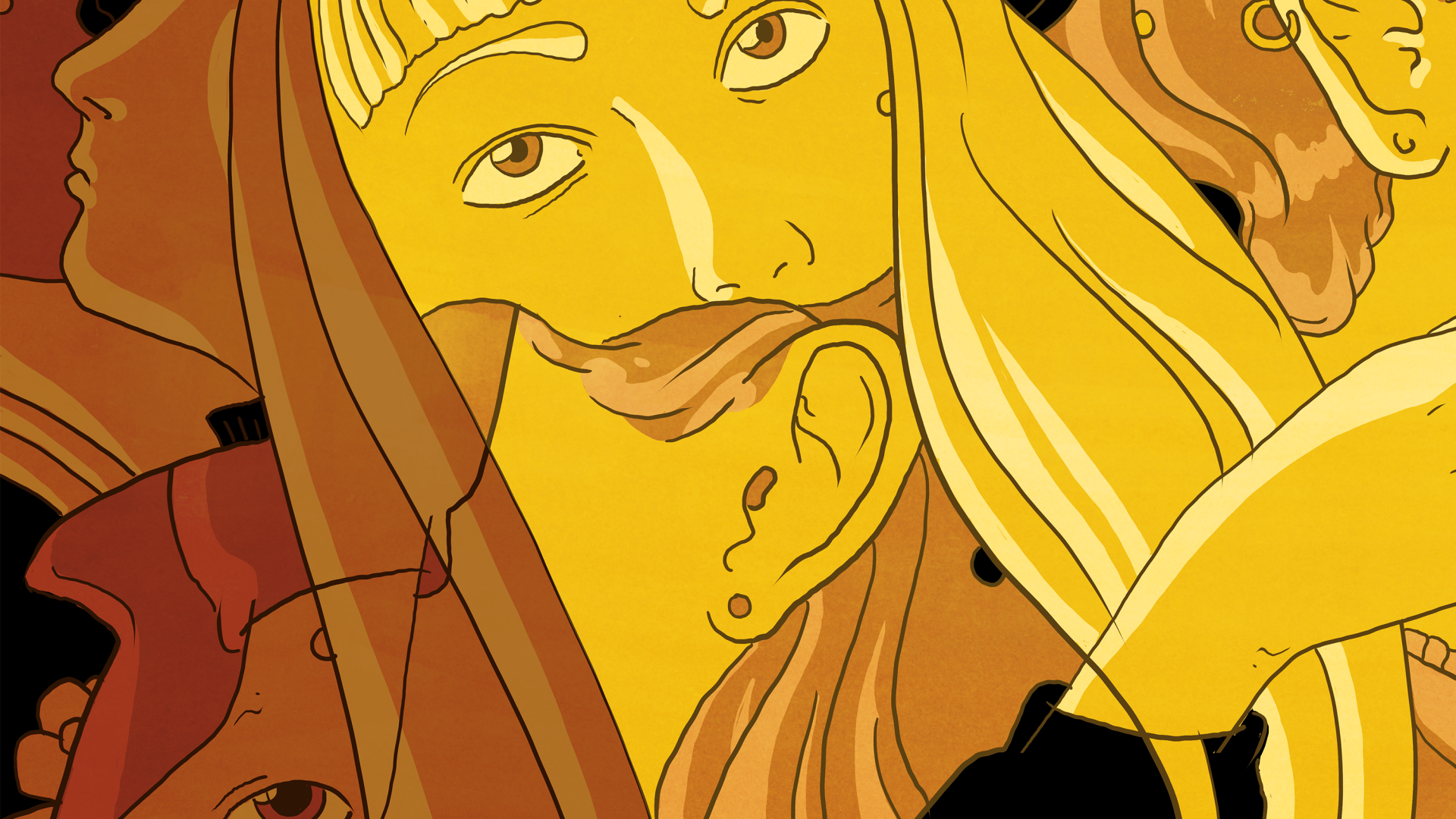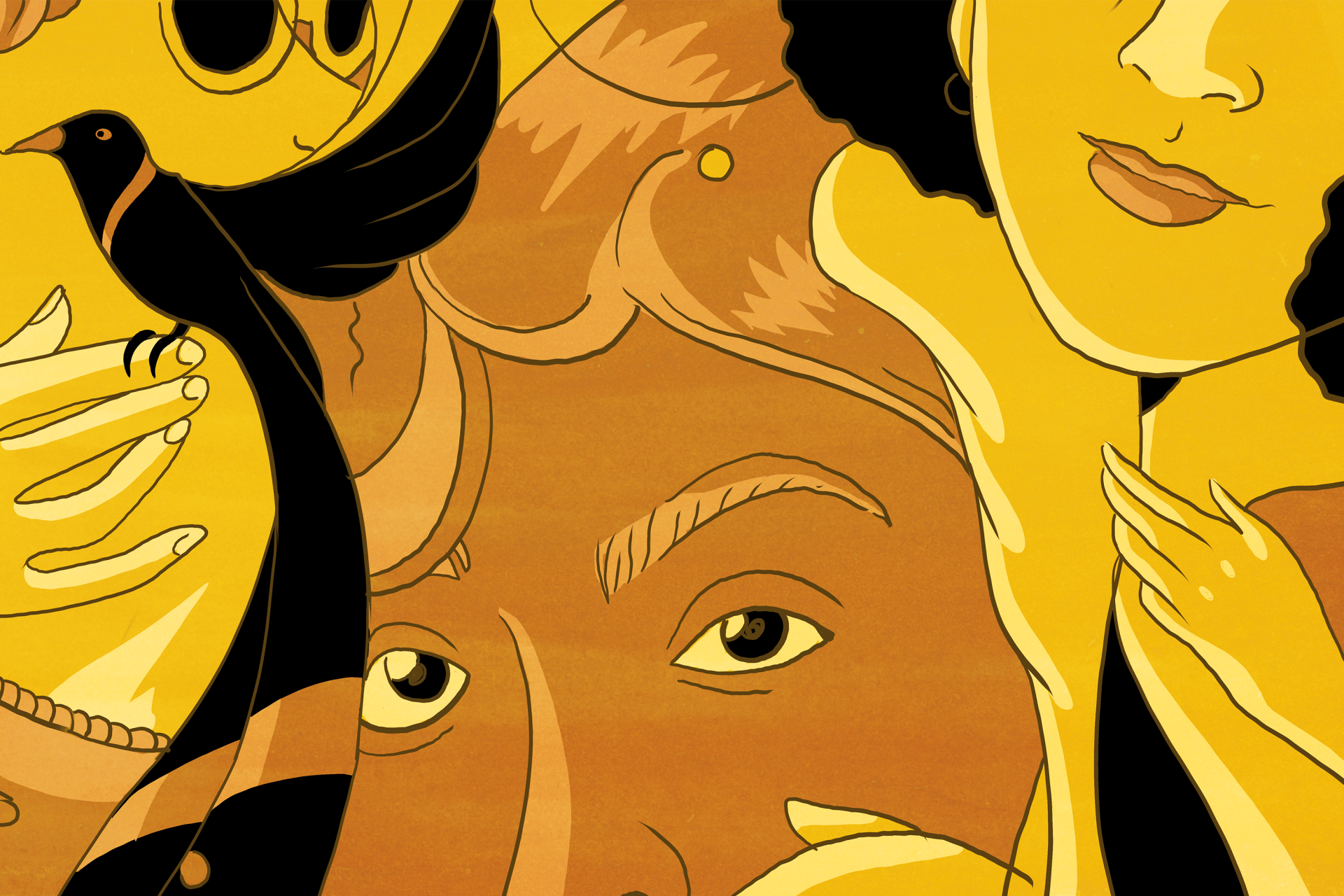Victims of abuse: ‘You always have the idea that you could have said no’
-
 Illustratie: Ivana Smudja
Illustratie: Ivana Smudja
Sexually transgressive behaviour can take on many different forms. It doesn’t always have to be accompanied by violence, and it can seep into a relationship gradually. Vox spoke to three Radboud University students who were victims of abuse. They talk about taboos and physical and psychological consequences that still affect them.
Julie* (24): ‘She would get really angry’
Julie was 13 when she first came into contact with Diana, a 21-year-old woman she met online. She had little contact with children her own age, and something clicked between her and Diana.
‘She knew exactly what to say to a 13-year-old. I was ‘so mature for my age, so clever, and so special.’ After a while, you start believing it yourself.’ Their contact at the time remained online, but it did become more intense, with Diana asking for explicit photographs and videos. ‘At some level, I knew that I shouldn’t go along with it. You hear about it everywhere, and my parents had often warned me about not sharing anything online. At the same time, I felt strongly that this was different. That it was real love.’
Get help after unwanted sex
Have you been involved in an unwanted sexual experience? At the Sexual Assault Center, you will be able to get help. Chatting or calling is anonymous: 0800-0188. Radboud University also has confidential advisors for employees and students where you can report undesired behaviour. You can find them here.
Read our interview with clinical psychologist Iva Bicanic, who coordinates the Sexual Assault Center, here. She explains why sexual assault has such an immense impact and how society can best attempt to handle this phenomenon.
After a while, Diana cut off contact. She may have become aware of the trouble she could get into if her contact with the underage Julie came to light. Years went by, until Julie, now aged 21, was once again approached by Diana.
‘It was such a strange moment. Because at the time, I had really become attached to her, and I would have liked nothing better than to be with her. But at the same time, I was also really angry about what had happened. And I wanted to know whether she still had photographs of me. That was the reason I responded to her contact request. And before I knew it, I got sucked into the relationship again.’
The two started a long-distance relationship, with occasional in-person meetings, but things became increasingly grim. ‘She would get really angry, and suddenly decide that she was done with me. I ended up doing everything I could to avoid this happening, and I became completely isolated. To the point where she was the only person left in my life.’
This led to Julie almost automatically doing everything Diana asked. ‘For example, she wanted me to keep an open telephone line with her all day, and even at night, so she could hear me. If the line ever dropped, she got angry. When I made plans on my own, she got angry. If she wanted something sexually and didn’t get it, she got angry.’
‘Abuse doesn’t necessarily mean that someone will drag you into the woods’
And so it happened that Julie repeatedly had sex with Diana against her will. ‘ Otherwise, she would become aggressive. Admittedly, this was an easy way for me to stop her from getting angry. Those were the hardest times, when I thought afterwards: I wish I’d said no.’
For a long time, Julie felt that it was all her fault. ‘This is the complicated thing in a situation in which you’re not being physically abused, but psychologically. The fact that you always have the idea that you could have said no. I could have said no, but at the time, it didn’t feel that way.’
This is also why Julie is sharing her story now. ‘Abuse doesn’t mean being dragged into the bushes with a knife at your throat. It can also be someone who makes you feel heard, and then tries to abuse you in this way.’
Julie has been in therapy for a while now, and she is now able to talk about what happened to her. ‘For a long time, I felt guilty and dirty. Now I’ve reached a point where I’m just angry. It’s actually very liberating.’ And yet, these events will always be part of her life. ‘Luckily, thanks to EMDR therapy (Eye movement desensitisation and reprocessing, a form of trauma processing therapy, Eds.), I’m much less likely to have a panic attack. I’ll always struggle with people being angry at me, but I hope that in the future, I’ll be able to deal with it better.’
Wies* (22): ‘When I felt pain, he would tell me that it was normal’
Last year, Wies met Stefan* on the dating app Bumble. The dating went by the book, but gradually, Stefan became more and more dominant. If Wies said she didn’t want sex, he convinced her to do it anyway. ‘If I felt pain, he told me that it was normal, and that I should accept the pain, rather than stopping.’ Because he was constantly talking to her and convincing her, Wies started to believe that what was happening was normal.
The trauma only became evident later. ‘I was diagnosed with PTSD (post-traumatic stress disorder, Eds.) and was treated for it using EMDR.’ The diagnosis came as a shock. It was a lot to take in. I also had lots of questions. What had happened to me? Why me? Why didn’t I notice that Stefan was abusing me?’
‘He continuously would try to make me dependent on him’
These questions were accompanied by feelings of guilt. ‘I had the idea that it was all my fault. It’s something I’ve really had to work on with my psychologist. Also, some of the people I knew couldn’t understand why I hadn’t ended my relationship with Stefan earlier. Why did I stay with him, when he treated me so badly?’ She says that breaking off a relationship 26 can be harder than you think. ‘A person can have so much influence on you that you feel that you can’t simply leave.
New Vox
This article can be found in the new Vox magazine, a special on transgressive behaviour. You can find the magazine in the stands around the campus, or you can read it online.
Stefan would constantly try to make me dependent on him.’ For example, he bought Wies really expensive gifts, that she didn’t want, and insisted on them moving in together. ‘I really didn’t want to. I couldn’t reciprocate the gifts at the time, and I was aware of the unequal power balance that this would lead to.’
At the time, Wies was not aware that Stefan was crossing her boundaries. ‘Some people in my life couldn’t understand that, which was really difficult.’ With the help of her psychologist, she learned more about it. ‘The brain can apparently suppress trauma for a very long time. As a result, you can literally forget what happened.’
She hopes that in future, people will be less quick to judge, especially when victims first share their experiences of sexually transgressive behaviour. ‘My advice is: just listen. And if you have questions, check first whether it’s OK to talk about it further.’
Her EMDR treatment is completed, but Wies still sees her psychologist on a regular basis. ‘After trauma treatment for sexual abuse, you’re not suddenly just back to being your old self. I’ve officially recovered from PTSD, but the memory and concentration problems still really affect me.’
David* (25): ‘He grabbed my head’
David was abused as a child. Later on, he was in a relationship that involved sexual abuse, and during his time as a student, he has repeatedly been the victim of sexually transgressive behaviour. ‘The shitty truth seems to be that this is a recurring theme in my life.’
The last time David was sexually abused was when he went home with a guy after an evening out with the association board. ‘He wanted to try all sorts of things, sexually. Apparently, he also felt invited to penetrate me. I was able to stop it, but it took a lot more insistence than I’d expected.’
Not respecting people’s personal boundaries is a recurring problem within associations, explains David. ‘It’s a rather licentious environment. People drink a lot and one-night stands are quite common. I found out that people are quick to conclude that it’s OK to cross boundaries that you haven’t even had a chance to establish yet.’
‘Just talking about experiences like these will trigger a lot of stuff’
Which is what happened on a date with another guy he’d met at the association board. ‘It was all fine until he grabbed my head and pushed it down on his penis. He kept on pushing. It happened totally out of the blue, as far as I was concerned. I thought: ‘No way are we doing this’, and I left.’
Although the University has a number of confidential advisors available, David did not contact them. ‘At the moment, I’ve got enough problems with my studies. Plus, I’ve spent the last few years in full-time therapy for the abuse I suffered as a child, and I’m still not done with it. It’s OK, but it leaves little room for an entirely new emotionally charged process.’
David also found it difficult to talk about these incidents in his association board. ‘You’re in a group where you all know each other. Talking about experiences like these will trigger a lot of stuff. If you’re feeling really strong, this doesn’t have to be a bad thing, but I really had other things on my mind.’
David is not planning to pursue this. ‘These experiences are a ‘light’ variant of what I experienced in the past. Sexually transgressive behaviour is very common in student circles. I don’t feel that I can do anything but accept it.’
Even though David has not sought help on campus, he does think that the University can raise students’ awareness of undesirable behaviour. ‘Consent is a great concept, but after a few beers, it’s no longer in everyone’s dictionary. Luckily, not everyone has to go through what I went through. But it’s easy to cross another person’s boundaries. Be aware of it, and talk about it.’
*At the request of the interviewees, all names in this article have been changed. The real names are known to the editors




